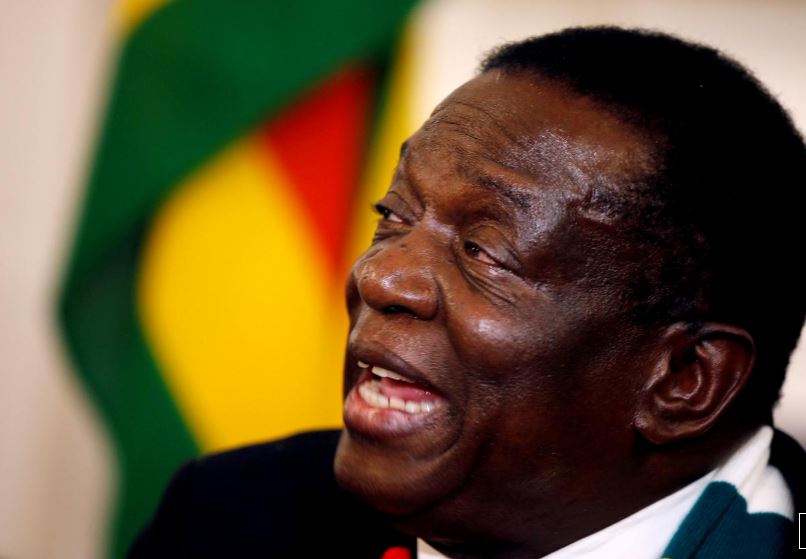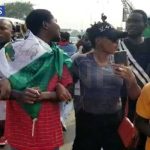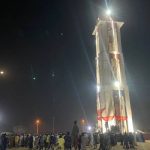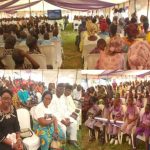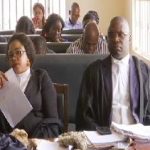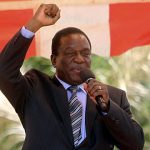Hundreds gathered around screens outside Zimbabwe’s top court on Wednesday to watch a legal showdown between President Emmerson Mnangagwa and the opposition leader challenging his July 30 election victory.
Hundreds of thousands more were expected to turn on their televisions to follow live footage of the Constitutional Court considering Nelson Chamisa’s petition that the vote was flawed and should be overturned.
Riot police blocked roads leading to the court in the capital Harare and vehicles carrying water cannon parked nearby.
Chamisa, 40, says the first vote since the removal of Robert Mugabe in November was rigged by a biased electoral commission. The Zimbabwe Electoral Commission (ZEC) and Mnangagwa say there was no foul play.
The court could throw the case out, declare a new winner or order a fresh election within 60 days.
The case has been cast as a major test of the independence of the highest court whose verdict cannot be appealed.
“The jurisprudential and political burden that weighs heavily on the shoulders of each of the Constitutional Court judges today is that they are about to adjudicate by far the most important case of their legal careers,” Welshman Ncube, a Chamisa ally and constitutional lawyer wrote on Twitter.
The election had been expected to end Zimbabwe’s pariah status and launch an economic recovery, but post-vote unrest has brought back uncomfortable reminders of its violent past.
Mnangagwa has urged Zimbabwe to unite behind him but questions remain over the death of six people in an army crackdown on protests against the ruling party’s victory.
Hundreds gathered around screens outside Zimbabwe’s top court on Wednesday to watch a legal showdown between President Emmerson Mnangagwa and the opposition leader challenging his July 30 election victory.
Hundreds of thousands more were expected to turn on their televisions to follow live footage of the Constitutional Court considering Nelson Chamisa’s petition that the vote was flawed and should be overturned.
Riot police blocked roads leading to the court in the capital Harare and vehicles carrying water cannon parked nearby.
Chamisa, 40, says the first vote since the removal of Robert Mugabe in November was rigged by a biased electoral commission. The Zimbabwe Electoral Commission (ZEC) and Mnangagwa say there was no foul play.
The court could throw the case out, declare a new winner or order a fresh election within 60 days.
The case has been cast as a major test of the independence of the highest court whose verdict cannot be appealed.
“The jurisprudential and political burden that weighs heavily on the shoulders of each of the Constitutional Court judges today is that they are about to adjudicate by far the most important case of their legal careers,” Welshman Ncube, a Chamisa ally and constitutional lawyer wrote on Twitter.
The election had been expected to end Zimbabwe’s pariah status and launch an economic recovery, but post-vote unrest has brought back uncomfortable reminders of its violent past.
Mnangagwa has urged Zimbabwe to unite behind him but questions remain over the death of six people in an army crackdown on protests against the ruling party’s victory.
Hundreds gathered around screens outside Zimbabwe’s top court on Wednesday to watch a legal showdown between President Emmerson Mnangagwa and the opposition leader challenging his July 30 election victory.
Hundreds of thousands more were expected to turn on their televisions to follow live footage of the Constitutional Court considering Nelson Chamisa’s petition that the vote was flawed and should be overturned.
Riot police blocked roads leading to the court in the capital Harare and vehicles carrying water cannon parked nearby.
Chamisa, 40, says the first vote since the removal of Robert Mugabe in November was rigged by a biased electoral commission. The Zimbabwe Electoral Commission (ZEC) and Mnangagwa say there was no foul play.
The court could throw the case out, declare a new winner or order a fresh election within 60 days.
The case has been cast as a major test of the independence of the highest court whose verdict cannot be appealed.
“The jurisprudential and political burden that weighs heavily on the shoulders of each of the Constitutional Court judges today is that they are about to adjudicate by far the most important case of their legal careers,” Welshman Ncube, a Chamisa ally and constitutional lawyer wrote on Twitter.
The election had been expected to end Zimbabwe’s pariah status and launch an economic recovery, but post-vote unrest has brought back uncomfortable reminders of its violent past.
Mnangagwa has urged Zimbabwe to unite behind him but questions remain over the death of six people in an army crackdown on protests against the ruling party’s victory.
Hundreds gathered around screens outside Zimbabwe’s top court on Wednesday to watch a legal showdown between President Emmerson Mnangagwa and the opposition leader challenging his July 30 election victory.
Hundreds of thousands more were expected to turn on their televisions to follow live footage of the Constitutional Court considering Nelson Chamisa’s petition that the vote was flawed and should be overturned.
Riot police blocked roads leading to the court in the capital Harare and vehicles carrying water cannon parked nearby.
Chamisa, 40, says the first vote since the removal of Robert Mugabe in November was rigged by a biased electoral commission. The Zimbabwe Electoral Commission (ZEC) and Mnangagwa say there was no foul play.
The court could throw the case out, declare a new winner or order a fresh election within 60 days.
The case has been cast as a major test of the independence of the highest court whose verdict cannot be appealed.
“The jurisprudential and political burden that weighs heavily on the shoulders of each of the Constitutional Court judges today is that they are about to adjudicate by far the most important case of their legal careers,” Welshman Ncube, a Chamisa ally and constitutional lawyer wrote on Twitter.
The election had been expected to end Zimbabwe’s pariah status and launch an economic recovery, but post-vote unrest has brought back uncomfortable reminders of its violent past.
Mnangagwa has urged Zimbabwe to unite behind him but questions remain over the death of six people in an army crackdown on protests against the ruling party’s victory.
Hundreds gathered around screens outside Zimbabwe’s top court on Wednesday to watch a legal showdown between President Emmerson Mnangagwa and the opposition leader challenging his July 30 election victory.
Hundreds of thousands more were expected to turn on their televisions to follow live footage of the Constitutional Court considering Nelson Chamisa’s petition that the vote was flawed and should be overturned.
Riot police blocked roads leading to the court in the capital Harare and vehicles carrying water cannon parked nearby.
Chamisa, 40, says the first vote since the removal of Robert Mugabe in November was rigged by a biased electoral commission. The Zimbabwe Electoral Commission (ZEC) and Mnangagwa say there was no foul play.
The court could throw the case out, declare a new winner or order a fresh election within 60 days.
The case has been cast as a major test of the independence of the highest court whose verdict cannot be appealed.
“The jurisprudential and political burden that weighs heavily on the shoulders of each of the Constitutional Court judges today is that they are about to adjudicate by far the most important case of their legal careers,” Welshman Ncube, a Chamisa ally and constitutional lawyer wrote on Twitter.
The election had been expected to end Zimbabwe’s pariah status and launch an economic recovery, but post-vote unrest has brought back uncomfortable reminders of its violent past.
Mnangagwa has urged Zimbabwe to unite behind him but questions remain over the death of six people in an army crackdown on protests against the ruling party’s victory.
Hundreds gathered around screens outside Zimbabwe’s top court on Wednesday to watch a legal showdown between President Emmerson Mnangagwa and the opposition leader challenging his July 30 election victory.
Hundreds of thousands more were expected to turn on their televisions to follow live footage of the Constitutional Court considering Nelson Chamisa’s petition that the vote was flawed and should be overturned.
Riot police blocked roads leading to the court in the capital Harare and vehicles carrying water cannon parked nearby.
Chamisa, 40, says the first vote since the removal of Robert Mugabe in November was rigged by a biased electoral commission. The Zimbabwe Electoral Commission (ZEC) and Mnangagwa say there was no foul play.
The court could throw the case out, declare a new winner or order a fresh election within 60 days.
The case has been cast as a major test of the independence of the highest court whose verdict cannot be appealed.
“The jurisprudential and political burden that weighs heavily on the shoulders of each of the Constitutional Court judges today is that they are about to adjudicate by far the most important case of their legal careers,” Welshman Ncube, a Chamisa ally and constitutional lawyer wrote on Twitter.
The election had been expected to end Zimbabwe’s pariah status and launch an economic recovery, but post-vote unrest has brought back uncomfortable reminders of its violent past.
Mnangagwa has urged Zimbabwe to unite behind him but questions remain over the death of six people in an army crackdown on protests against the ruling party’s victory.
Hundreds gathered around screens outside Zimbabwe’s top court on Wednesday to watch a legal showdown between President Emmerson Mnangagwa and the opposition leader challenging his July 30 election victory.
Hundreds of thousands more were expected to turn on their televisions to follow live footage of the Constitutional Court considering Nelson Chamisa’s petition that the vote was flawed and should be overturned.
Riot police blocked roads leading to the court in the capital Harare and vehicles carrying water cannon parked nearby.
Chamisa, 40, says the first vote since the removal of Robert Mugabe in November was rigged by a biased electoral commission. The Zimbabwe Electoral Commission (ZEC) and Mnangagwa say there was no foul play.
The court could throw the case out, declare a new winner or order a fresh election within 60 days.
The case has been cast as a major test of the independence of the highest court whose verdict cannot be appealed.
“The jurisprudential and political burden that weighs heavily on the shoulders of each of the Constitutional Court judges today is that they are about to adjudicate by far the most important case of their legal careers,” Welshman Ncube, a Chamisa ally and constitutional lawyer wrote on Twitter.
The election had been expected to end Zimbabwe’s pariah status and launch an economic recovery, but post-vote unrest has brought back uncomfortable reminders of its violent past.
Mnangagwa has urged Zimbabwe to unite behind him but questions remain over the death of six people in an army crackdown on protests against the ruling party’s victory.
Hundreds gathered around screens outside Zimbabwe’s top court on Wednesday to watch a legal showdown between President Emmerson Mnangagwa and the opposition leader challenging his July 30 election victory.
Hundreds of thousands more were expected to turn on their televisions to follow live footage of the Constitutional Court considering Nelson Chamisa’s petition that the vote was flawed and should be overturned.
Riot police blocked roads leading to the court in the capital Harare and vehicles carrying water cannon parked nearby.
Chamisa, 40, says the first vote since the removal of Robert Mugabe in November was rigged by a biased electoral commission. The Zimbabwe Electoral Commission (ZEC) and Mnangagwa say there was no foul play.
The court could throw the case out, declare a new winner or order a fresh election within 60 days.
The case has been cast as a major test of the independence of the highest court whose verdict cannot be appealed.
“The jurisprudential and political burden that weighs heavily on the shoulders of each of the Constitutional Court judges today is that they are about to adjudicate by far the most important case of their legal careers,” Welshman Ncube, a Chamisa ally and constitutional lawyer wrote on Twitter.
The election had been expected to end Zimbabwe’s pariah status and launch an economic recovery, but post-vote unrest has brought back uncomfortable reminders of its violent past.
Mnangagwa has urged Zimbabwe to unite behind him but questions remain over the death of six people in an army crackdown on protests against the ruling party’s victory.

